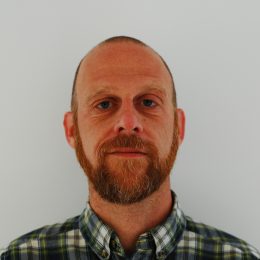Bridging Gaps: Improving access to healthcare for women who have experienced trauma
The Bridging Gaps project aims to improve access to GP practices for people who have experienced trauma and have complex needs. Services often aren’t equipped to meet these needs, worsening already severe health inequalities.
Bridging Gaps was started by academic GP Lucy Potter and a group of Bristol women who have experienced trauma, including addiction, homelessness, mental health problems, sexual exploitation, street sex work, domestic and sexual violence, and poverty.
Working alongside ARC West researcher Michelle Farr and professionals from One25, a charity that supports women who street sex work in Bristol, Bridging Gaps have been improving access to primary care. They have been collaborating with GP practices and GP trainees and have been supported by researchers from the University of Bristol in the Centre for Academic Primary Care and the National Institute for Health and Care Research (NIHR) Applied Research Collaboration West (ARC West).
Bridging Gaps has been funded through the National Institute for Health and Care Research (NIHR) School for Primary Care Research, Q Exchange by the Health Foundation and NHS England and NHS Improvement, and NIHR Research Capability Funding through the NHS Bristol, North Somerset and South Gloucestershire CCG. It has also been funded by the Co-Production Collective (formerly UCL Centre for Co-production in Health Research) as part of the 2019/20 Phase 2 Pilot Projects.
Project aims
Our goal was to improve access to primary care for people who have complex needs and have experienced trauma, in collaboration with GP practices and people with lived experience. We wanted to offer tailored approaches for different GP practices, to improve access for people who may otherwise struggle to get the services they need.
What we did
We developed a training course together and facilitated this at five different GP practices. We worked in more depth with three practices to develop service changes to improve access for people with complex needs.
We also helped develop a specialised clinic for people with complex needs at one of these practices – Wellspring in east Bristol. This new service is helping people with complex needs who haven’t seen a GP for many years.
A researcher who wasn’t involved in developing Bridging Gaps interviewed those who’d taken part in the project’s work to improve access, including:
- Bridging Gaps members with lived experience
- Researchers
- Charity staff
- GPs
These interviews aimed to understand:
- How collaborative approaches need to be developed to ensure safe and effective working relationships with people who have experienced trauma
- Key issues, challenges and strategies to improve access to primary care for people who have complex needs
Together with the women involved in Bridging Gaps, we have presented at national and international conferences about what we have achieved and how primary care can be more inclusive for people who have complex needs.
How we involved people
We have tried to put the principles of co-production into practice. This includes sharing decision-making and power, and valuing everyone’s knowledge and point of view.
We worked with women with lived experience of complex needs from the start and developed the Bridging Gaps project together. We shared decision-making as much as possible at every stage, meeting every two weeks wherever possible, to make sure everyone has a voice in how things develop. We share our learning about how collaborative approaches can be tailored to support people who have experienced trauma in an article published in Health Expectations.
What we found and what this means
We’ve worked in-depth with three general practices to improve access for people with complex needs. In this part of the project, motivated general practice staff worked with lived experience members to combine everyone’s insights, to make practical changes so that people who experience health inequalities and have multiple needs can more easily access healthcare.
This resulted in service changes such as developing care coordinator roles, patient lists to support access to patients in greater need and an information sharing tool. Helping establish a new clinic at Wellspring GP practice for people with complex needs was a great achievement for those involved in Bridging Gaps:
“Working in collaboration with Wellspring has been such a positive experience. I was surprised at how willing they were to work with Bridging Gaps and how seriously they took our suggestions and feedback.”
The chance to make real changes to services was an important reason for women with experience of complex needs to get involved:
“Working with Bridging Gaps has given me a real sense of pride and fulfilment, to actually see changes happening because of such amazing and strong women is fantastic. Working with GPs to be more trauma-informed in services is such a vital part of supporting women who have been through so much in their lives.”
Bridging Gaps was awarded two Great Practice Awards 2020 for ‘Inspiring Change’ and facilitating ‘Independent Futures’. These were awarded by Golden Key, a partnership which works to improve services for Bristol citizens with the most complex needs.
We have also been awarded the 2022 University of Bristol Open Research Prize in the category of Widening Reach.
Women who have been part of Bridging Gaps have shared their perspectives on what it’s like to be part of the project:
“Working alongside professionals in a co-production setting has given me a voice, and a sense of belonging. My voice matters. Being with other women who have experienced the same type of trauma as myself makes me feel less alone. I never used to like talking about my past but being in such a safe space gave me the confidence to speak out about the injustices I had been through. I have gained so many skills and made lasting friendships which I will always treasure. Thank you Bridging Gaps you are perfect in every way.”
“Since joining I feel I’ve grown as a person. I can use my own experiences to help other people. That’s been therapeutic and empowering. We are taking control and not just being heard but actually making important changes. Our lived experience makes us valuable experts.”
“Bridging Gaps has been there for me. I’ve met inspirational women who are my friends and I’ve learnt that no matter how small the change, that we are people that have a voice and we matter, no matter what happens, and that together we can make change happen.”
What next?
We are keen to influence wider healthcare systems and are connected into other initiatives such as the Bristol, North Somerset and South Gloucestershire Integrated Care Board’s work on Women’s Health Hubs, and their trauma-informed systems work. This will help influence regional plans for health and social care that meets the needs of those who have experienced trauma. Recently we have contributed to Bristol City Council’s strategy for homelessness and their health needs assessment for street sex workers. We are looking to initiate further research to improve support for women who street sex work.
We have connected with Pathway, a national organisation that aims to transform health services for homeless people. We have shared our learning to inform national training they are developing for Integrated Care Board leaders. We have contributed to a NHS England online course: Working with people and communities to improve general practice in primary care.
We have also shared our learning about how to facilitate more collaborative research within primary care through an international collaboration, and together have published an article on how to partner with communities in primary care research. We have also published an article on how health inequalities can be tackled together in primary care, working alongside different communities.
Papers
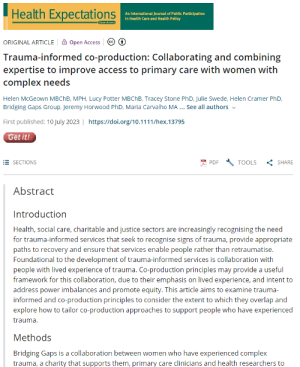
Trauma-informed co-production: Collaborating and combining expertise to improve access to primary care with women with complex needs
Read the paper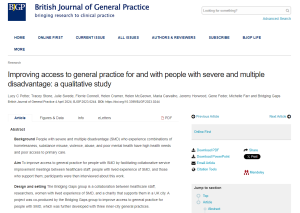
Improving access to general practice for and with people with severe and multiple disadvantage: a qualitative study
Read the paper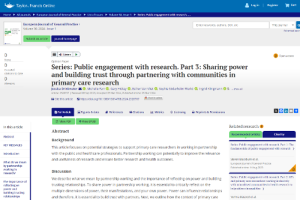
Series: Public engagement with research. Part 3: Sharing power and building trust through partnering with communities in primary care research
Read the paper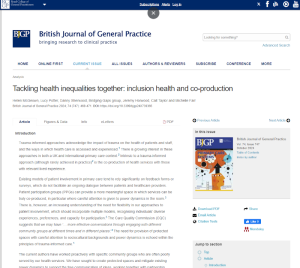
Links and downloads
- Read NIHR's Making a Difference case study on Bridging Gaps Bridging Gaps in primary healthcare for women with complex needs
Lead collaborators
- Dr Lucy Potter, University of Bristol
- Dr Helen McGeown, University of Bristol
- Dr Helen Cramer, University of Bristol
- Dr Lesley Wye, University of Bristol
- Dr Natalia Lewis, University of Bristol
- Florrie Connell, One25
- Maria Carvalho, One25
ARC West Staff
Professor Jeremy Horwood
Professor of Social Sciences and HealthPartners on this project
Bristol, North Somerset and South Gloucestershire Integrated Care Board
The Integrated Care Board (ICB) is responsible for the day-to-day running of the NHS. The NHS Bristol, North Somerset and South Gloucestershire ICB takes account of population needs, arranges for the provision of services and manages the NHS budget.
